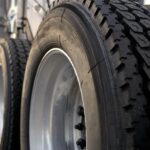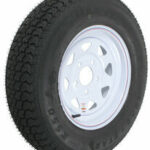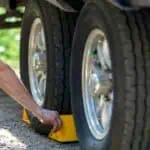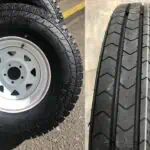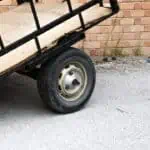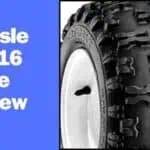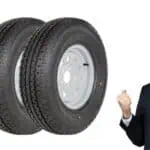Trailer tires are designed to lean when the trailer is connected to a tow vehicle. This helps distribute the weight of the trailer and its contents evenly between the two axles, which makes for a smoother ride. The downside to this is that it can make your trailer tires wear out faster than if they were level.
If you notice your trailer tires leaning, there are a few things you can do to correct it.
Trailer tires typically have a lot of weight on them, which can cause them to lean. There are a few different reasons why your trailer tires may be leaning. First, the weight of the trailer itself can cause the tires to lean.
If the trailer is overloaded, it can also cause the tires to lean. Additionally, if the trailer is not level, it can also cause the tires to lean. Finally, if the trailer hits a pothole or bump in the road, it can also cause the tires to lean.
If you notice that your trailer tires are leaning, it’s important to take action to correct the issue. Otherwise, it could lead to further problems down the road.
Why Do My Trailer Tires Lean? Details Here!
What Causes Trailer Tires to Lean?
Trailer tires typically lean because of improper inflation or overloading. Improper inflation can cause the tire to lean to one side or the other, while overloading can cause the entire trailer to lean. If you notice your trailer tires leaning, check the pressure and adjust as needed.
You may also need to redistribute weight inside the trailer itself.
Why are My Trailer Tires Wearing Uneven?
There are a few reasons why your trailer tires might be wearing uneven. One reason could be that the axle isn’t aligned properly, causing one tire to bear more of the weight than the other. This can happen if you hit a pothole or curb too hard, so be careful when driving!
Another reason for uneven tire wear could be that your tires are inflated to different levels. You should always inflate your tires to the recommended PSI level, which can usually be found on the side of the tire. Finally, if you frequently tow heavy loads with your trailer, this could also cause uneven tire wear over time.
If you notice that your trailer tires are wearing uneven, make sure to have them checked out by a professional to avoid any accidents on the road.
Are Trailer Tires Supposed to Be Balanced?
Most people believe that trailer tires should be balanced, but this is not always the case. Depending on the size and weight of your trailer, you may not need to balance your tires. If you are unsure, it is best to consult with a professional to see if balancing is right for your trailer.
How Do I Know If My Trailer Bearings are Bad?
If you’re wondering whether or not your trailer bearings are bad, there are a few things you can look for. First, if you feel any unusual vibration coming from the trailer while it’s being towed, that’s a sign that something may be wrong. Additionally, if you notice that your trailer is veering to one side or the other while being towed, that could also indicate a problem with the bearings.
Finally, if you hear strange noises coming from the area around the wheels of your trailer while it’s in motion, that’s another red flag. If you notice any of these things, it’s best to have your bearings checked out by a professional as soon as possible to avoid further damage.
Trailer Axles And Tires Flex During Turning
In many cases, the trailer axles and tires will flex during turning. This is due to the fact that they are not attached to the frame of the vehicle in a way that would prevent this from happening. The result is that the tires can rub against the inside of the fenders or even come into contact with the ground if they are not properly inflated.
In some cases, this can cause damage to the tire or even cause a blowout.
What Causes a Trailer Tire to Wear on the Inside
If you’ve ever noticed that your trailer tires seem to be wearing down faster on the inside than the outside, you might wonder what causes this. The answer is actually quite simple – it’s all about weight distribution.
When a trailer is loaded, the majority of the weight is typically concentrated in the middle of the trailer.
This means that the tires in the middle of the trailer are carrying more weight than those on the sides. Over time, this extra weight can cause the tread on these tires to wear down more quickly, resulting in a “bald spot” in the center of the tire.
There are a few things you can do to help prevent this from happening.
First, make sure that your trailer is evenly balanced when loading it. This will help distribute the weight more evenly and reduce wear on any one tire. Second, consider using heavier-duty tires in the middle of your trailer.
These tires are designed to handle extra weight and will better withstand repeated use with a heavy load.
By following these tips, you can help extend the life of your trailer tires and keep them looking good for longer!
Trailer Wheel Leaning Inward
If you notice your trailer’s wheels leaning inward, there are a few possible causes. First, check the air pressure in the tires. If they’re low, add air until they’re at the correct level.
Next, check to see if the axle is bent. If it is, you’ll need to replace it. Finally, make sure that the coupler is properly secured to the ball on your tow vehicle.
If it’s loose, tighten it up.
Why Does My Trailer Bounce When Empty
If you’ve ever taken your trailer out for a spin without any cargo in it, you may have noticed that it tends to bounce around quite a bit. This can be annoying and even dangerous if not addressed. So why does this happen?
Essentially, when a trailer is empty, there’s nothing inside to act as counterweight to the bumps and turns of the road. This causes the suspension to work overtime in an attempt to keep the trailer level, which results in all that bouncing.
There are a few things you can do to mitigate this problem.
First, make sure that your trailer’s tires are properly inflated. This will help give them some extra cushioning against bumps. Secondly, consider adding some weight to the front or rear of the trailer (depending on its design) to help balance things out.
And finally, if all else fails, you can always just load up your trailer with some cargo!
Why Do Trailer Tires Wear Out So Fast
If you’ve ever owned a trailer, you know that one of the most frustrating things about them is how quickly the tires wear out. It seems like no matter how often you check the air pressure or how carefully you drive, the tires always seem to need replacing after just a few thousand miles.
So what causes this rapid tire wear?
There are actually a few different factors at play. First, trailers are typically heavy and loaded down with cargo, which puts extra strain on the tires. Second, trailers are often towed behind larger vehicles, which can cause the tires to flex and bend more than they would if they were just carrying their own weight.
And finally, trailer tires tend to be made of softer rubber compound than regular passenger car tires, which means they wear down faster under duress.
Second, try to avoid potholes and other rough road conditions when possible – again, this will help reduce tire flexing. And finally, don’t overload your trailer – distribute the weight evenly and keep it as light as possible to minimize stress on the tires. By following these simple tips, you can help your trailer tires last longer – and save yourself some money in the process!
What Causes Cupping on Trailer Tires
If you’ve ever noticed unusual tire wear on your trailer tires, it’s likely due to cupping. Cupping occurs when small sections of the tire tread become detached from the rest of the tire. This can happen for a number of reasons, but most often it’s due to improper inflation or imbalance.
If your trailer tires are frequently under-inflated, this can cause the tread to separate from the sidewall. The result is an uneven surface that makes contact with the road, which leads to cupping. Imbalance is another common cause of cupping.
If your trailer wheels are out of balance, they’ll spin unevenly and put extra stress on certain areas of the tire tread. Over time, this can cause sections of the tread to break away. If you suspect your trailer tires are suffering from cupping, it’s important to have them inspected by a professional as soon as possible.
Once cupping starts, it will only get worse over time and could eventually lead to a blowout. In some cases, you may be able to repair cupped tires by having them re-treaded or replaced. However, if the damage is severe enough, you may need to purchase new tires altogether.
Bent Trailer Axle Symptoms
If you notice your trailer starting to lean to one side, or if it seems like your tires are wearing unevenly, these could be signs that your trailer axle is bent. Other symptoms of a bent trailer axle include:
• Difficulty steering
• Uneven tire wear
• Trailer wobbling or shaking
• Suspension problems
If you suspect that your trailer axle is bent, it’s important to have it checked out by a professional as soon as possible. A bent axle can cause serious damage to your trailer and even lead to accidents.
Conclusion
If your trailer tires are leaning, it’s most likely due to improper inflation. When a tire is properly inflated, the weight of the trailer is evenly distributed across the tire. This prevents any one side of the tire from bearing more weight than the other, which can cause the tire to lean.
To fix this problem, simply check your trailer’s tire pressure and inflate them as needed. It’s also a good idea to check your tires regularly to ensure they’re always properly inflated.
